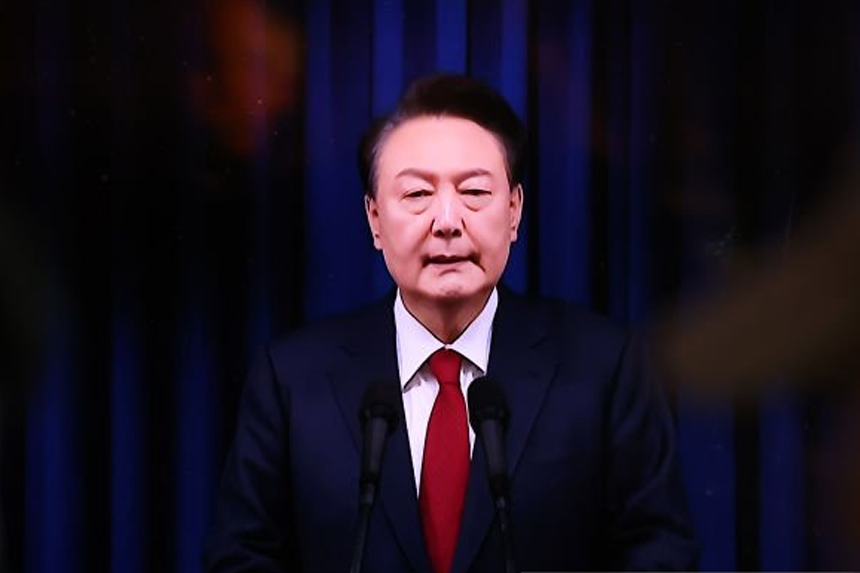Yoon Suk Yeol, the suspended president of South Korea, is still standing his ground in his recently reinforced home as the arrest warrant for his contentious martial law decree draws to a close. Over the weekend, the standoff escalated as Yoon’s security detail went to great lengths to keep investigators from taking him into custody. Barbed wire and bus-made obstacles were erected around the compound to stop officials from trying again. This continued disobedience is a part of the increasingly polarized public sentiment and growing doubts about the robustness of South Korea’s legal system surrounding President Yoon’s arrest.
When investigators attempted to conduct an arrest operation at Yoon’s home last Friday, tensions rose. A six-hour standoff resulted from the presidential security services service blocking their attempts. The operation was cancelled because of the strong opposition from Yoon’s security detail. Investigators had come to question Yoon on allegations of mutiny and abuse of authority. Discussions concerning the validity of President Yoon’s martial law decree and his defiant position against his arrest have heated up due to this standoff.
What Are the Increasing Public Unrest and Legal Difficulties?
The problem has gotten worse because Yoon has repeatedly refused to show up for questioning. According to his attorneys, the arrest warrant is “illegal,” as the anti-corruption investigators lack the jurisdiction to supervise a case as serious as rebellion. “The warrant was issued without the proper authority, and this investigation has been conducted unlawfully,” claimed Yoon’s legal team. These arguments draw attention to the intricate legal dispute underlying the arrest attempt, with many people wondering what the ramifications of this high-profile case against a sitting president would mean.
Since the president tried to implement martial law, claiming that North Korea and “anti-state forces” posed a threat, the nation has been in disarray. Due to the backlash his actions caused, protests against and in support of the president have been taking place for weeks. Thousands of demonstrators braved deep snow over the weekend, adding to the tense political atmosphere. With differing views on whether President Yoon’s actions were warranted, his incarceration has emerged as a significant topic in the national conversation.
The fact that Yoon is still president until the constitutional court renders a decision about his impeachment is one of the leading causes of dispute. The presidential security team, headed by security service chief Park Jong-joon, uses Yoon’s position as president as an excuse for preventing the arrest. said, “For the PSS, whose primary mission is the absolute safety of the president, to comply with the execution of an arrest warrant amidst ongoing legal disputes would be tantamount to abandoning its duty.” Allegations that the security agency was serving as Yoon’s “private militia” were strongly refuted by Park. “We have a clear responsibility to protect the president,” he continued.
How Are Investigators Proceeding Despite Legal Obstacles?
Investigators are adamant about moving forward despite the continued disobedience. They have asked police to help carry out the arrest warrant and have clarified that they intend to extend it. If the existing one expires without a resolution, they could request a new detention warrant, letting Yoon be detained for a maximum of 20 days. However, considering the Presidential Security Service’s adamant opposition, whether this strategy will succeed is still unclear.
“The challenge now is to enforce the law, and we will continue to pursue this investigation,” a law enforcement official stated. Despite this, many opposition members have expressed their unhappiness with the seeming lack of progress. To arrest Yoon, some lawmakers have demanded that investigators use greater force and be “firmer and with sufficient means” to pursue the case. The circumstances surrounding President Yoon’s detention have become pivotal in the nation’s political history.
Yoon’s attorneys recently accused the government of essentially holding the president captive in his own home. They accused the investigators of violating his constitutional rights and breaking the law when they filed charges against them. According to a member of his legal team, Yoon has been essentially imprisoned in his home. The arrest warrant against President Yoon has triggered discussions concerning the constitutionality of the government’s and law enforcement’s activities.
What Is the International Reaction to the Divergent Public Opinions?
Public opinion remains sharply split as the impasse continues. Large crowds of Yoon supporters have gathered outside his home to show their support and allegiance to his choice to oppose the legal proceedings. Widespread protests have also resulted from the public’s mounting ire at his conduct. The circumstances have raised concerns about the nation’s future course and contentious discussions about the efficiency and robustness of South Korea’s political and judicial systems. As seen by President Yoon’s resistance to the detention, deep political divisions exist in South Korea.
The situation is also garnering attention on a global scale. Since President Yoon’s martial law order caught Washington off guard, the US government, in particular, has been overseeing it. Yoon’s position on security matters, especially those about China and North Korea, had received backing from the Biden administration. However, the US was unprepared for the instability that followed Yoon’s unilateral declaration of martial law without first contacting Washington.
In an attempt to reaffirm the US’s commitment to its alliance with South Korea, US Secretary of State Antony Blinken addressed the tensions during his visit to Seoul. During a joint press conference, Blinken stated, “We stand firmly with the Korean people as they work tirelessly to uphold their democratic systems, and we have full confidence in South Korea’s institutions.” “Korea has penned one of the world’s most potent and inspirational democracy tales over the last forty years. Just as American democracy has experienced difficulties throughout history, your democracy has been tested in recent weeks. However, in response, you are exhibiting your democratic resilience.
Blinken’s visit highlights how complicated the situation is. The result of the political crisis might have long-term effects on both domestic and foreign ties, and it is testing the stability of South Korea’s democracy. The current state of affairs surrounding President Yoon’s detention will significantly impact the nation’s political climate.
What Geopolitical Consequences Do South Korea and the Region Face?
The stakes are enormous for the entire region, not just South Korea. The future of trilateral collaboration between the US, South Korea, and Japan is unknown since Donald Trump, the new US president, is expected to take office in a few weeks. Yoon’s successor could have a different objective and change his foreign policy, especially regarding Japan and North Korea.
It’s unclear if Yoon will be able to stay in power as tensions rise both domestically and internationally or if South Korea’s democracy will withstand the crisis and emerge stronger. The future of the security dynamics in the area is at stake as critical elections approach and the US administration prepares for a leadership transition.








